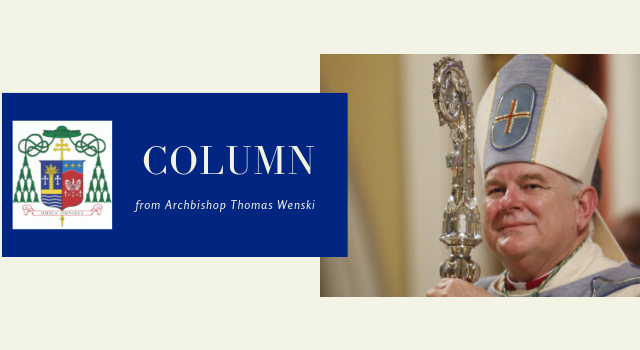By Archbishop Thomas Wenski - The Archdiocese of Miami
In advance of a meeting of policy makers in Glasgow later this year, the UN’s Intergovernmental Panel on Climate Change issued earlier this month a key scientific report on the pace of global warming. For those concerned about rising sea levels along our Florida coasts, the news was not good.
Five years ago, in publishing Laudato Si, Pope Francis called climate change “one of the principal challenges facing humanity in our day” (no. 25). On August 17, the Archdiocese of Miami cosponsored a ZOOM workshop on Laudato Si. And five years on, Laudato Si remains relevant to any discussion on climate change — or, as the Pope would frame it, on “creation care.”
In Laudato Si, Pope Francis — as popes have done in previous social encyclicals — attempts to engage the world in a dialog. In doing so, he presents a vision of the human person, of our place and our dignity in the world, which the Church recognizes as both fallen and redeemed. Thus, it is a vision that is rooted in the Gospel and enshrined in the Church’s moral teachings. The pope is not a scientist. He does not speak as a scientist but as a pastor, and whatever affects the human person and human flourishing has ethical and moral dimensions and thus is of concern to the Church and her pastors.
The Holy Father declares that “we need only take a frank look at the facts to see that our common home is falling into serious disrepair” (Laudato Si, no. 60). Pope Francis is more than just a prophet of gloom and doom, but he certainly does not pull any punches in assessing the problems we face. Francis explains “that human life is grounded in three fundamental and closely intertwined relationships: with God, with our neighbor and with the earth itself” (no. 66).
Scripture tells us that “these three vital relationships have been broken, both outwardly and within us. This rupture is sin. The harmony between the Creator, humanity and creation was disrupted by our presuming to take the place of God and refusing to acknowledge our creaturely limitations” (Ibid).
In our relationship with the earth, the Holy Father zeroes in on the impacts of pollution, lack of clean water, toxic waste, and climate change.
Pope Francis is just as frank about the state of our human relationships. Just as we favor laws that limit the danger of pollutants damaging our sensitive ecosystems, should we not be concerned about the “toxic waste” of pornography and its effects on the human ecology of the young? We need to protect the rain forests, but can we hope to care for the gifts of the earth if we refuse to care for one another? (cf. no. 117)
He emphasizes that our ecological challenges weigh heavily on those who can least carry the burden — the poor. A “throwaway” culture does not just pollute our rivers and oceans with discarded plastic: We throw away human beings as well, including life in the womb. We neglect the disabled and show little respect for the lives and contributions of the elderly.
And so, Pope Francis calls us to both a natural ecology as well as a human ecology, for there is also a “pollution of the heart” as shown by human trafficking that has become a massive global industry.
To undertake this great work of “creation care” that integrates a natural ecology with a human ecology, we must restore all our relationships in a full way: with God, with our neighbor and with the earth itself.
Laudato Si is a rich and complex document — one that is much more than just a treatise on "climate change." I came across one commentator who said that to make it just about "climate change" would be like making the Thanksgiving dinner feast about the cranberries.
Our human nature — like Mother Nature itself — is a “gift of the Creator who designed its intrinsic order, and in this way provided the instructions for us to consult...” In Manila when he visited the Philippines after a devastating typhoon, Pope Francis, citing a popular adage, said, “God always forgives, we sometimes forgive, but when nature — creation — is mistreated, she never forgives.”
Pope Francis really does weave together a hopeful message in Laudato Si. He tells us that “the Creator does not abandon us; he never forsakes his loving plan or repents of having created us. Humanity still has the ability to work together in building our common home.”


Comments from readers